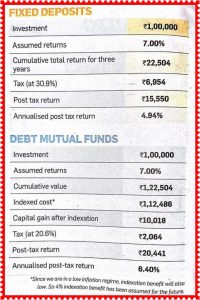Let’s say you just received a pay raise in office and now you want to celebrate. After all the hard work you’ve put in, you deserve better right? Maybe you want a fancier car, a bigger apartment, or you just want to eat out more often.
Regardless of how you choose to spend your new money, you’ve just fallen for lifestyle inflation.
To understand the concept better, let us take an example; 35-year old Sumeet, a manager working in an MNC received a hike and his salary increased from 60,000 to 80,000. But he also increased his expenses from 40,000 to 60,000. This change was mostly a lifestyle upgrade; moving into a larger flat, switching from a domestic vacation to an international one, dining out every two weeks or visiting the salon more often. In addition, his regular expenses will also increase. This is very accurately termed as lifestyle inflation.
What Is Lifestyle Inflation?
Lifestyle inflation is when you increase your spending as your income goes up. After all, it seems doable. By itself, lifestyle inflation is not a problem. It becomes one when you increase your expenditure faster than your income. If your savings rate isn’t at least keeping up with your rising spending, you might end up worse than when you were making less.
Why can’t high-income earners retire or reach financial independence sooner?
Whether you are earning 15 lakhs or 50 lakhs per annum, accomplishing financial independence is not easy. This is weird since at least theoretically it’s achievable for any income level. If one invests 25 times their current annual expenses, they can live off the returns for good.
Say your current annual expenses are 10 lakhs and you have a corpus of 2.5 crore. You should be able to withdraw 10 lakhs adjusted for inflation every year perpetually assuming your investments continue to earn about 10% annual returns.
Straightforward isn’t it, but wait. Unless you’re extremely thorough in controlling lifestyle inflation, retirement moves further away as your income increases.
So what if your income increases but your savings, not as much?
Unless you add the major chunk of salary increases to your investing allocation so that your lifestyle doesnt inflate significantly, you would eventually start spending more than 10 lakhs. You may not want that 10 Lakhs life anymore; especially if it means downgrading all your stuff. You might now be used to a 15 lakhs lifestyle.
So the irony is that unless you ensure you increase your savings rate as your incomes rises, it can take longer to reach your retirement goal.

Why High Savers Need to Save More of Their Hikes
Imagine two different investors: Rohit and Virat. Both earn the same after-tax income of 20 lakhs per annum. But they save different amounts. Rohit saves half (50%) of his income every year, while Virat saves a quarter (25%) yearly. This translates into Rohit spending 10 lakhs annually and Virat spending 15 lakhs annually.
If we assume that Rohit and Virat both want to spend the same amount of money in retirement as they did while working (i.e. lifestyle maintenance), then Rohit will need less money than Virat to retire. If we also assume that each investor needs 25x of their annual expenses to retire comfortably, then Rohit requires 2.5 crore, while Virat will require 3.75 crore to retire. Assuming a 4% real rate of return and no changes in their income/savings rates over time, Rohit can retire in 23 years while Virat will take 35 years.
Now, let’s progress 10 years into the future. Rohit has accumulated close to 1 cr and Virat about 62 lakhs. They are both still on track to retire as per their original schedules (i.e. Rohit in 13 years and Virat in 25 years).
Now both of them get a raise of 10 lakhs per annum increasing their earnings to 30 lakhs annually (after-tax). How much of this raise should Rohit and Virat save if they want to retire on their original schedule? You might think, “Just save at their original savings rate,” right? But if Rohit saves 50% of his raise and Virat saves 25% of his raise, this would actually delay their retirements.
Why? Because their retirement goal hasn’t accounted for their increase in spending as a result of their raise. If Rohit is now making 30 lakhs a year and saving 50% of it (15 lakhs) then he is also spending the other half: 15 lakhs. Since his spending has increased from Rs. 10 lakhs to 15 lakhs a year, his spending in retirement must increase if Rohit wants to maintain his new 15 lakhs a year lifestyle.
This implies that Rohit now requires 4.5 crore to retire instead of his original 3 crore. However, because Rohit saved for 10 years as if he only needed 3 crore for retirement, he must now work longer to make up for this lower level of savings in his past.
With 1 crore invested and annual savings of 12 lakhs (at a 4% rate of return), Rohit would reach his 4.5 crore retirement goal 19 years from now instead of his original plan to retire 13 years from now. His lifestyle expenses pushed back his retirement date.
How Much of Your Raise Should You Save?
As we can learn from Rohit and Virat, the key aspect in deciding how much of your income hike you have to save (to have the same retirement date) is your current savings rate.
We suggest that you save half of your income increases simply because this is what will work for most people most of the time. Assuming that the majority of savers have savings rates in the 10%-25% range, then the 50% limit is the correct solution.
Living above your means is often caused by the following 2 factors:
Entitlement
Entitlement is the feeling that one deserves more. After working so hard, you find it perfectly right to treat and pamper yourself. Though this is not always a bad idea, splurging excessively can hamper long term financial plans.
Social Comparison
As the name suggest, this is the typical human trait of comparing ourselves to others. With the onset of social media, we are no longer comparing ourselves to people we actually know but to anyone and everyone. Looking at their “perfect” pictures, we sometimes feel ours are not enough and in the quest to “win” we spend more fueling lifestyle inflation. The danger here is that today’s wants can become tomorrow’s needs.

Strategies for Avoiding Lifestyle Inflation
A hard truth is you don’t have to spend more money just because you earn more money. The secret is to upgrade your lifestyle gradually and always living below your means. An expensive car might require pricier services and repairs, and a big house requires more maintenance. Don’t make drastic changes to your lifestyle in the first month; celebrate modestly instead.
We often buy more because we believe owning those things will make us happier? Sometimes we need to pause and analyze whether that is truly the case. But saving more will lead to reaching financial independence sooner.
Nassim Taleb’s wrote in his book Fooled by Randomness: “You get rich, then move to rich neighbourhoods and then become poor again.” Social comparison makes you feel like a failure among people who are richer than you. Consequently, you feel stressed and are likely to spend more to elevate your social status.
Give new money a purpose ASAP
Be it a salary hike, bonus, tax rebate or gift, being purposeful about what you’ll do with any extra cash prevents waste. Some suggestions: make larger loan repayments, step up your emergency fund or hike your investments.
Stop Scrolling on and on with Social Media
Anyone would feel low seeing their old classmate’s mansion tour on Instagram. But spending just to match others can put you on a steep spiral to lifestyle inflation. Try to focus on what really matters to you and how you’re going to build or acquire it.
What is the limit? How much of my extra cash can I enjoy?
I agree that we all can and should enjoy some of our increased income? But how much? What percent? It depends on your initial savings rate but for many the limit is about 50%. Once you spend more than 50% of your future raises, then you start delaying your retirement.
It might seem absurd that earning extra money without saving enough of it can delay your retirement, but we will see how this is true. In fact, people with higher savings rates have to save a larger percentage of their future raises (if they want to retire on the same schedule) than people who have lower savings rates. Once you understand the math of this, the 50% limit will make sense.




